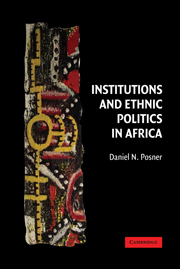Book contents
- Frontmatter
- Contents
- Preface
- INSTITUTIONS AND ETHNIC POLITICS IN AFRICA
- 1 Introduction
- I Introduction to Part I
- II Introduction to Part II
- III Introduction to Part III
- IV Introduction to Part IV
- Appendices
- A Native Authorities and Tribal Identifications
- B Survey and Focus Group Methodologies
- C Tribal Affiliations of Parliamentary Candidates
- D Tribal Demographics of Electoral Constituencies
- Bibliography
- Index
- Titles in the series
C - Tribal Affiliations of Parliamentary Candidates
Published online by Cambridge University Press: 05 June 2012
- Frontmatter
- Contents
- Preface
- INSTITUTIONS AND ETHNIC POLITICS IN AFRICA
- 1 Introduction
- I Introduction to Part I
- II Introduction to Part II
- III Introduction to Part III
- IV Introduction to Part IV
- Appendices
- A Native Authorities and Tribal Identifications
- B Survey and Focus Group Methodologies
- C Tribal Affiliations of Parliamentary Candidates
- D Tribal Demographics of Electoral Constituencies
- Bibliography
- Index
- Titles in the series
Summary
Many of the analyses reported in this book involve comparing the tribal backgrounds of parliamentary candidates with the tribal demographics of the constituencies in which they competed. Undertaking these analyses required collecting information about candidates' tribal affiliations. Due to the very large number of candidates whose tribal backgrounds I was interested in ascertaining, it was impossible to contact each candidate or, when they were deceased, their living family members directly. Instead, I took advantage of the fact that a person's tribal affiliation can be discerned from their name with a high degree of accuracy in Zambia, particularly by those who come from the same part of the country.
I began by drawing up a list of every candidate who had run in the elections of 1968, 1973, 1978, 1983, 1988, 1991, and 1996, as well as in all Third Republic by-elections held through the end of 1999. I then sorted this master list by district, generating 57 separate worksheets containing inventories of every candidate that had ever run for Parliament in that district. These worksheets contained a total of 2,231 different candidates.
The data-collection exercise took place during July and August 1999. My strategy was to track down, in Lusaka, people from each district who could serve as informants on the tribal backgrounds of the candidates from their district. I especially sought out older men or women who had spent a major portion of their lives in the district in question.
- Type
- Chapter
- Information
- Institutions and Ethnic Politics in Africa , pp. 308 - 309Publisher: Cambridge University PressPrint publication year: 2005



